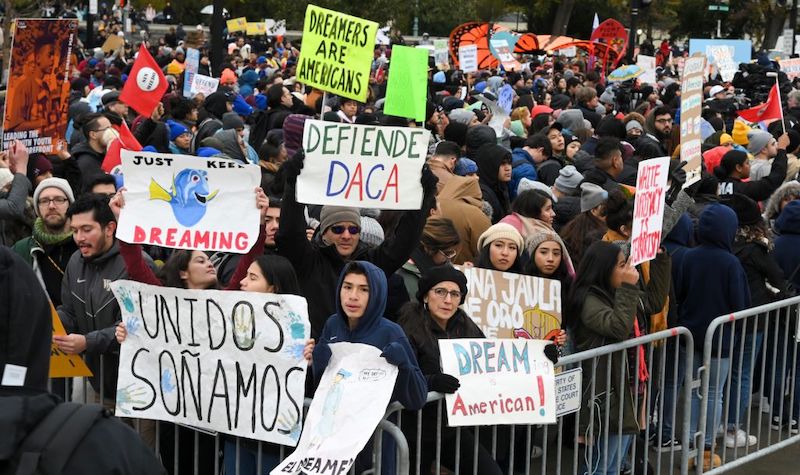Regulatory Review
What Will Happen to DACA?

Despite notching several critical legal victories this year, including one at the U.S. Supreme Court, supporters of a federal program that protects Dreamers—immigrants brought to the United States as children—must put the celebrations on hold yet again.
In the latest chapter of a nearly decade-long legal battle, the fate of that program—called Deferred Action for Childhood Arrivals (DACA)—now lies in the hands of a federal judge in Texas who immigration advocates fear will terminate the program.
DACA began in 2012 when the U.S. Department of Homeland Security (DHS) issued a memorandum making Dreamers eligible to obtain legal status that would defer potential immigration proceedings. This relief, which can be renewed every two years, shields Dreamers who meet stringent criteria from deportation and allows them to obtain work authorization among other benefits. Since its enactment, DACA has protected 800,000 noncitizens from deportation and more than 1.3 million other immigrants remain eligible for the program.
For years, DACA had enjoyed wide bipartisan support. But in 2017 the Trump Administration attempted to rescind the program, claiming that it was “an unconstitutional exercise of authority by the Executive Branch.” In response, multiple plaintiffs challenged the rescission as “arbitrary and capricious” in violation of the Administrative Procedure Act. This summer, the Supreme Court agreed with the plaintiffs, upholding the program against the Trump Administration’s effort to disband it—a major victory for the program’s beneficiaries and immigration advocates.
Following the Supreme Court’s decision, a federal judge ordered DHS to restore the program to its original form after the agency refused to do so. The judge specifically required DHS to resume reviewing and approving new DACA applications and work permits immediately, marking another victory for the program’s supporters.
But ongoing litigation in Texas threatens DACA supporters’ winning streak.
This case began in 2018 when Texas Attorney General Ken Paxton and several other states filed a lawsuit arguing that DHS exceeded its authority by creating DACA without the consent of Congress. Because this case is the only one that directly challenges DACA’s legality, an adverse decision in this litigation could permanently end the program—an outcome that became more likely when the case was transferred to Judge Andrew S. Hanen, according to some advocates.
Appointed by President George W. Bush, Judge Hanen is perhaps best known for his 2015 decision to enjoin two other Obama-era immigration initiatives closely related to DACA. The first initiative sought to expand DACA to include an additional 330,000 people. The second initiative aimed to offer DACA-like protections to undocumented parents of U.S. citizens or lawful permanent residents.
In that litigation, 26 states challenged the two initiatives in Southern Texas, knowing they were likely to come before Judge Hanen, whose earlier rebukes of President Obama’s immigration policies “made him an inviting decision-maker.” When the case was indeed assigned to Judge Hanen, one commentator concluded that the plaintiff states had “already won the first round in court.”
As predicted, Judge Hanen enjoined the two initiatives, holding that President Obama exceeded his authority when he enacted them. The U.S. Court of Appeals for the Fifth Circuit—perhaps the most conservative federal appeals court in the country—upheld Judge Hanen’s decision. On further appeal, the Supreme Court—with only eight justices after Justice Antonin Scalia’s untimely death—was evenly divided on the issue, which meant Judge Hanen’s initial injunction remained in place. Although the ruling had no effect on DACA itself, it effectively terminated the two related initiatives.
When the Texas attorney general and other plaintiff states mounted the 2018 challenge to DACA’s legality, they relied heavily on the reasoning Judge Hanen employed when he enjoined the two DACA-related programs. But, in a decision that surprised some observers, Judge Hanen declined to halt DACA at the outset of litigation. Although the judge believed the program was likely illegal, he explained, “the egg has been scrambled,” and thus it did not make sense to “put it back in the shell,” at least until he could consider the parties’ arguments in full.
In 2020, shortly after the Supreme Court rejected the Trump Administration’s rescission attempt, Judge Hanen directed the parties to bring their claims before him once more, suggesting he might be prepared to put the eggs back in the shell….read the rest here.

